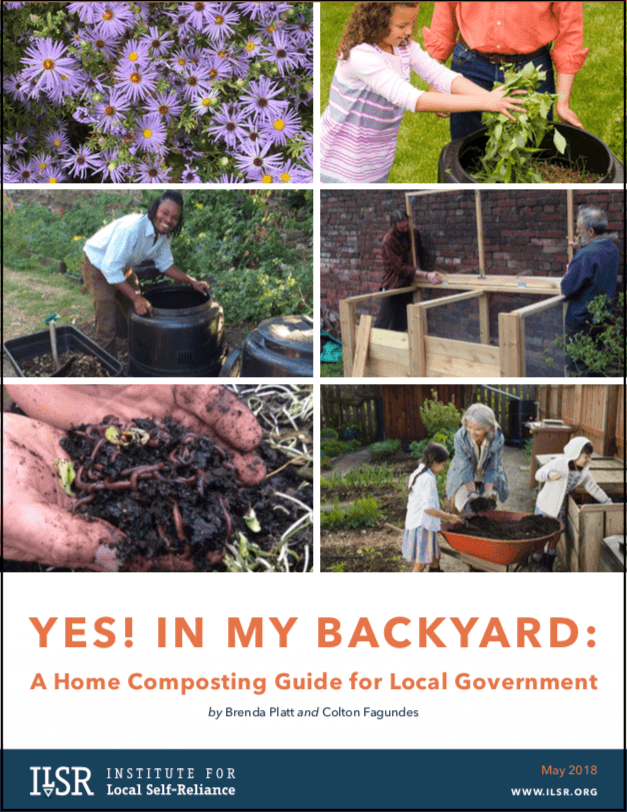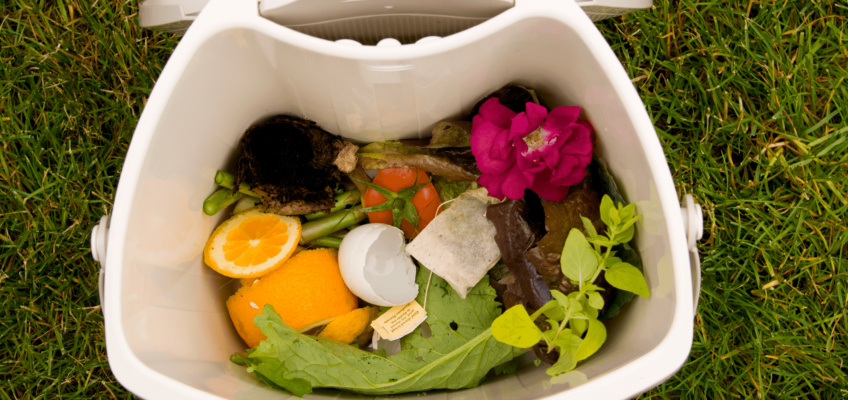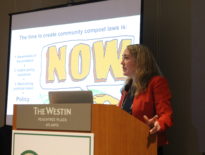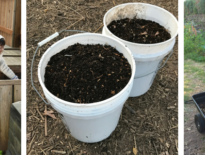
New Report Argues Home Composting Is Vital to Local Waste Reduction Strategies
The report from the Institute for Local Self-Reliance profiles home composting programs to share lessons learned and expand their reach
(Download Press Release PDF)
WASHINGTON, D.C. — Tackling the problem of food waste is gaining attention to avoid garbage, conserve resources, create jobs, alleviate hunger, and reduce greenhouse gas emissions. A new report from the Institute for Local Self-Reliance (ILSR) details how home composting is among the best opportunities to reduce food waste, especially in the near term and in areas lacking curbside collection or facilities to compost.
In Yes! In My Backyard: A Home Composting Guide for Local Government, co-authors Brenda Platt and Colton Fagundes profile 11 city and county home composting initiatives (10 in the U.S. and 1 in Canada) to share lessons learned and expand adoption. Training, education, and offering bins for free or at discounted prices topped the replication tips.
“Home composting is undervalued and far more important than previously thought,” says Brenda Platt. “The potential to expand home composting is largely untapped but massive. But it needs to be resourced and prioritized.” Yes! In My Backyard: A Home Composting Guide for Local Government calls for local governments to incentivize citizens to home compost by providing training, guidance, equipment, and exposure to best practices.
The report found that for every 10,000 households composting at home, between 1,400 and 5,000 tons per year could be diverted from curbside collection, with potential savings in avoided disposal costs alone ranging from $72,000 to $250,000.
The authors call for local governments to think of curbside collection of yard trimmings or food scraps as a complement to a home composting program, not a replacement. Home composting programs remain a cheap and effective way to reduce municipal garbage and engage more people directly with the composting process. Local governments can avoid the labor and costs of collecting and handling material, leading to considerable savings. Compost produced at home also enhances soil in residential yards and gardens. In Orlando, Fla., one of the profiled communities, Ian Jerguson, the City’s home composting program manager, believes “Backyard composting is a great way to engage residents about the importance of recycling their food scraps at home.” Carl Grimm at Oregon Metro, another profiled program, points out that home composting makes sense on many levels, including “its ability to connect us and our children to the natural world and to help ignite a passion for protecting our planet.”
“Personalized training and support sets folks up for success,” says report co-author Colton Fagundes. “Fun and creative outreach and marketing will draw people in.” Orlando’s Jerguson agrees, “We found that appealing to a person’s sense of humor, through our ‘Get Dirty’ campaign, was the most effective way to get someone to pay attention to an important topic like food waste.”
In addition to the 11 case studies, Yes! In My Backyard: A Home Composting Guide for Local Government acts as a reference guide for local governments starting their own home composting programs and provides tips and steps for implementing a program. Key takeaways and recommendations include:
Offer Bins
- Provide composting bins to residents: purchase in bulk through a contract with manufacturers and sell the bins at the wholesale prices; subsidize the price of bins; or provide vouchers or rebates to give residents discounts on bins sold at local retailers.
- Support a variety of bin types to accommodate a range of options and household/backyard situations, including worm bins and do-it-yourself bins.
Educate and Train
- Offer education and training to enable home composters to succeed, troubleshoot on their own, and produce high-quality compost.
- Tie training to bin give-aways or distribution. Training ensures residents are exposed to best management practices.
- Make education and training easily accessible in order to encourage participation.
Measure, Evaluate, and Improve
- Calculate your program’s costs and savings. Over time, home composting programs can be expected to save local governments more money in hauling and tipping fees than they cost to implement.
- Solicit volunteers to weigh materials home composted in order to estimate tonnage diverted and savings from hauling and disposal tipping fees.
Outreach and Market
- Develop strong outreach efforts and innovative marketing campaigns to increase program participation.
- Invest in a strong marketing push when launching program to interest people right from the beginning.
Embrace Supportive Rules
- Review existing laws and rules to make sure none prevent home composting. Update any archaic laws or pass new ordinances to support home composting.
- Focus any new ordinance or rule toward fostering successful and well operated home composting rather than creating prescriptive requirements that may unnecessarily stifle home composting.
Read Yes! In My Backyard and explore more of ILSR’s resources on the benefits of community composting.
(Download Press Release PDF)
###
Brenda Platt is the director of ILSR’s Composting for Community Initiative. She has worked more than three decades fighting trash burners and promoting waste reduction, recycling, and composting. She is the author of several groundbreaking reports including Beyond 40 Percent: Record-Setting Recycling and Composting Programs and the U.S. EPA’s Cutting the Waste Stream in Half. Her most recent reports are: The State of Composting in the U.S.: What, Why, Where, & How, Growing Local Fertility: A Guide to Community Composting, and BioCycle’s Residential Food Waste Collection Access Study. In 2017, the U.S. Composting Council awarded Platt its H. Clark Gregory Award for outstanding service to the composting industry through grassroots efforts. She has home composted her food scraps and yard trimmings for 31 years, and has been licensed in Maryland to operate commercial scale facilities.
Contact Nick Stumo-Langer to set up an interview at 612-844-1330 or at stumolanger@ilsr.org.
ABOUT INSTITUTE FOR LOCAL SELF-RELIANCE:
The Institute for Local Self-Reliance (ILSR) is a national public interest organization founded in 1974 to support environmentally sound and equitable community development. ILSR provides research and technical assistance on recycling, composting, zero waste planning and implementation, decentralized clean energy, community broadband, independent businesses, and other facets of a homegrown economy.





